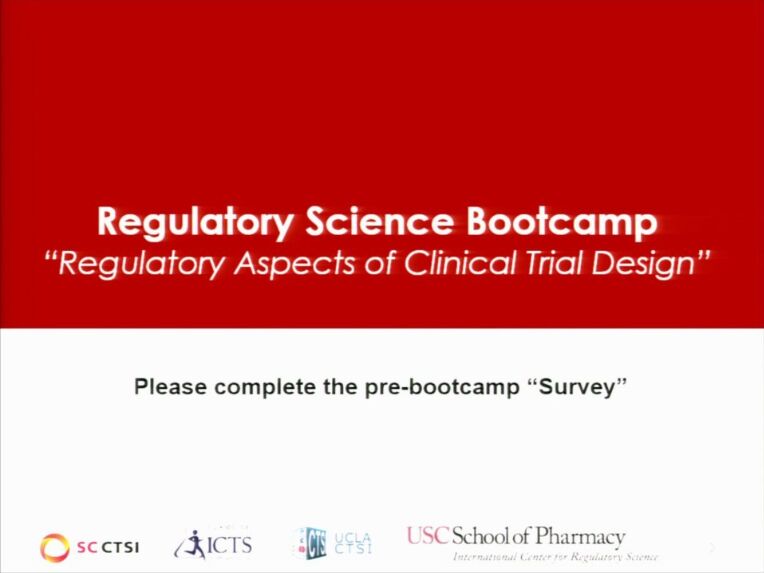- Presentation Title: Regulatory Science Bootcamp: Regulatory Aspects of Clinical Trial Design Introduction
- Presented by Dr. Pacifici
- USC 5 Graduate Programs in Regulatory Sciences
- SC CTSI Clinical Research Support (CRS)
- Logistics
- Poll Time!
- How would you best describe yourself?
- How long have you been in your role?
- In which of the following types of studies are you involved? (Industry, investigator, Both, Not involved)
- Where are you from?
- Are you currently being funded by a CTSA Hub?
- What is your knowledge of regulatory aspects of clinical trial design? 9Novice, Intermediate, Expert)
- What learnings do you hope to take away from today?
- An intent to treat (ITT) analysis includes all data from participants in the groups to which they were randomized even if they never received study drug or placebo (T/F).
- Select the current FDA Commissioner: Margaret Hamburg, Scott Gottlieb, Mike Pence, Alex Azar
- Which of the following is the most difficult to change? (CFR Title 21, Guidance Document: Unique Device Identification: Direct Marketing of Devices, FDARA, CDER Mobile Device Policy)
- Randomization in clinical trials helps to…
- Which of the following describes an adaptive clinical trial design?
- Which of the following elements poses challenges specific to medical device clinical trials?
- How many novel drugs were approved by CDER in 2017?
- Presentation Title: Key Terms “Clinical Trial Design Terminology that Regulatory uses”
- Presented by Nancy Pire-Smerkanich, DRSc, MS
- Let’s all speak the same language. (Importance of knowing commonly used terms)
- Key Terms: Baseline, Bias, Blinding, Randomization, Controlled trials, Causal effect, Adverse effect, Adverse reaction/adverse event, Clinically significant, Null hypothesis, Statistically significant, P-value, Intent to treat analysis (ITT), Per Protocol Analysis, Interim analysis,
- Some trials do not use the word “blinding” because it creates negative bias and scares subjects
- Types of Blinding: Unblinded/open label, Single blind/single-masked, double blind/double-masked, triple blind
- Types of Controlled Studies: Active Control Study, Placebo Control Study, Historical Control
- Key Terms includes statistically terminology
- Q&A with Dr. Pire-Smerkanich, Swag Giveaway
Regulatory Science Symposium: Regulatory Aspects of Clinical Trial Design Session 1: Intro/Key Terms (2018)
In this session, we will discuss commonly used terms in clinical trial design and regulatory science.
Chair and Associate Professor of Regulatory and Quality Sciences Associate Director, D. K. Kim International Center for Regulatory Science
Assistant Professor, USC Mann Dept. of Regulatory and Quality Sciences; Associate Director, Regulatory Knowledge and Support
Course Syllabus/Topics
Acknowledgement
Accompanying text created by Annie Ly | Undergraduate Research Associate and Provost's First Generation Research Fellow | lyannie@usc.edu


